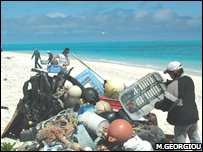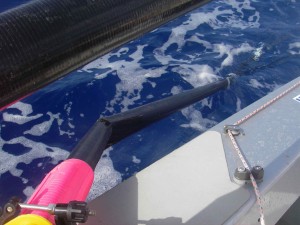HUGE apologies for not having blogged for so long. I am still alive and kicking and last sighted in Washington DC, via a hectic weekend in New York.
I attended 4 Oxford University events in as many days, in both New York and DC - networking with the great and the good and rustling up some funding.
I am now in DC for a series of meetings with various environmental organizations. There's lots of really good stuff happening, but all slightly speculative at the moment - I will tell all as things become definite.
I am just now dashing off to a "Seaweed Session" - a social occasion organized by the nonprofit that I row for, the Blue Frontier Campaign. Must run, but will write again soon!
|
|

The environmental time bomb represented by plastic in the world's oceans has at last come to the attention of the media. Thank you to the many people who have sent me links to recent coverage in the British press, much of it arising from the publication of a study by a team at the University of Plymouth.
Dr Richard Thompson suggests that microscopic pieces of plastic are being eaten by similarly microscopic organisms - and the digestion process then releases the toxins (like DDT) from the plastic. The toxins are absorbed by the tiny creature, which gets eaten by the slightly larger creature, and so on up the food chain. All the way up the food chain the toxins accumulate, until at the top of the ocean food chain are the carnivorous fish - which get eaten by us. So we end up eating the poisons that we created.
So what goes around comes around - and in a very obvious way. How could we ever have thought it would be otherwise? We live on a planet of finite size. We have polluted it and abused it with growing intensity, as our population has increased and our appetite for processed food and manufactured goods has increased. And the oceans have for a long time been regarded as a bottomless landfill - out of sight was out of mind.
But even the oceans, vast as they are, have reached their limit, and now we are reaping what we have sown - we are eating our own man-made poisons.
Do take a look at this article, and also follow the links on the right to other articles.
There are also links and articles on rozsavage.com, including an article kindly written by Dr Richard Thompson specifically for my website. Follow the links to other pages on this site revealing some startling facts and what we can all do to help. Click here for more on Oceans in Crisis.
|
|

Many thanks to all who have exercised their minds and Googles to help me find lead shot to ballast my boat. It has been a huge assistance and much appreciated. I am happy to announce that, as of today, the problem is resolved.
Ken, whose comments you may have seen on this site, put me onto a supplier in LA. So I then emailed Paul at the LA Adventurers Club (where I spoke last year) to ask if any of his members fancied a journey up the coast to deliver 200lb of lead shot. Funnily enough, they didn't, but he was able to suggest another company in Santa Rosa, called Santa Rosa Lead Products (!). He also gave me a contact number and suggested I call Adrianne, whom he had already warmed up by telling her my story. Luckily she had also read about me in the local press, so she was delighted to be able to help.
They have given me a discount on the lead, and are also going to deliver it free of charge - which is wonderful, because the shipping would have been prohibitive.
So it is due to be delivered later this week.
Meanwhile, Nancy has been hard at work over the weekend, building a new skeg for the boat, extending the existing shape of the hull downwards to create more stability and hopefully also to keep the stern into the wind, which as well as further increasing stabililty (the waves passing harmlessly along the sides of the Brocade rather than slamming into her from the side) might earn me a few extra miles - making up for the slowing effect of the lead.
We are also looking at the feasibility of taking carbon fibre oars as my spares, rather than the heavy wooden ones that last year added so much weight up high, turning the Brocade into a kind of metronome - all that weight up top made her very unstable and vulnerable to capsize.
The problem here is that the primary oars use a different kind of oarlock than the carbon fibre oars, but one of my noble volunteers, Reuben from the Dolphin Rowing Club, is investigating the feasibility of a sleeve insert that will enable me to substitute one kind of oarlock for another.
The spare oars would only be required if I lose or break one of the primaries - and if the weather is rough enough to break a solid ash oar with carbon fibre wrap, then it's a bad day at the office...
[photo: what we're trying to avoid - a carbon fibre oar breaks during the Atlantic crossing. This is why I now have heavy, but well-balanced, wooden oars.]
|
|
A few people have raised the very valid point that putting extra weight in my boat will slow me down. Fans of Rob Hamill's book, The Naked Rower, will recall that he was obsessive about keeping excess weight to as little as possible, taking only the bare (!) minimum of personal items and even dumping food overboard when it became clear that they were going to finish sooner than expected.
By adding up to 100kg (220lb) of lead to my boat - the equivalent of a pretty big passenger - I will undoubtedly be slowing down the boat. However, the effect on my daily mileages may not be as great as you'd think. These words from Phil Morrison, the boat designer:
The extra weights (50kg or 100kg) will increase the whetted area and hence the drag by 1.8% and 3.5% (we can ignore the other forms of resistance at the speed you will be moving). This amounts to 0.9% and 1.7% decrease in speed for the same power input. That equates to 0.6 mile per day for the worst case, assuming you can manage around 35 miles a day. It may be possible that the extra stability will make the boat easier to row and you'd get that back in practice, who knows?
So I think I can live with that as a percentage. My priority for the Pacific, which is not a race, is to have a good time, rather than make good time.
On the Atlantic I made life difficult for myself by being impatient to get across. In fact my original goal had not been to compete in a race at all, but simply to have a big adventure and hopefully learn a few things about life along the way - and to share that adventure and those life lessons with anybody who might be interested.
So if it takes me a few extra days, but those extra days are good days, then I don't mind.
Remind me I said this when I've been eating ocean rations for 4 months!!
|
|